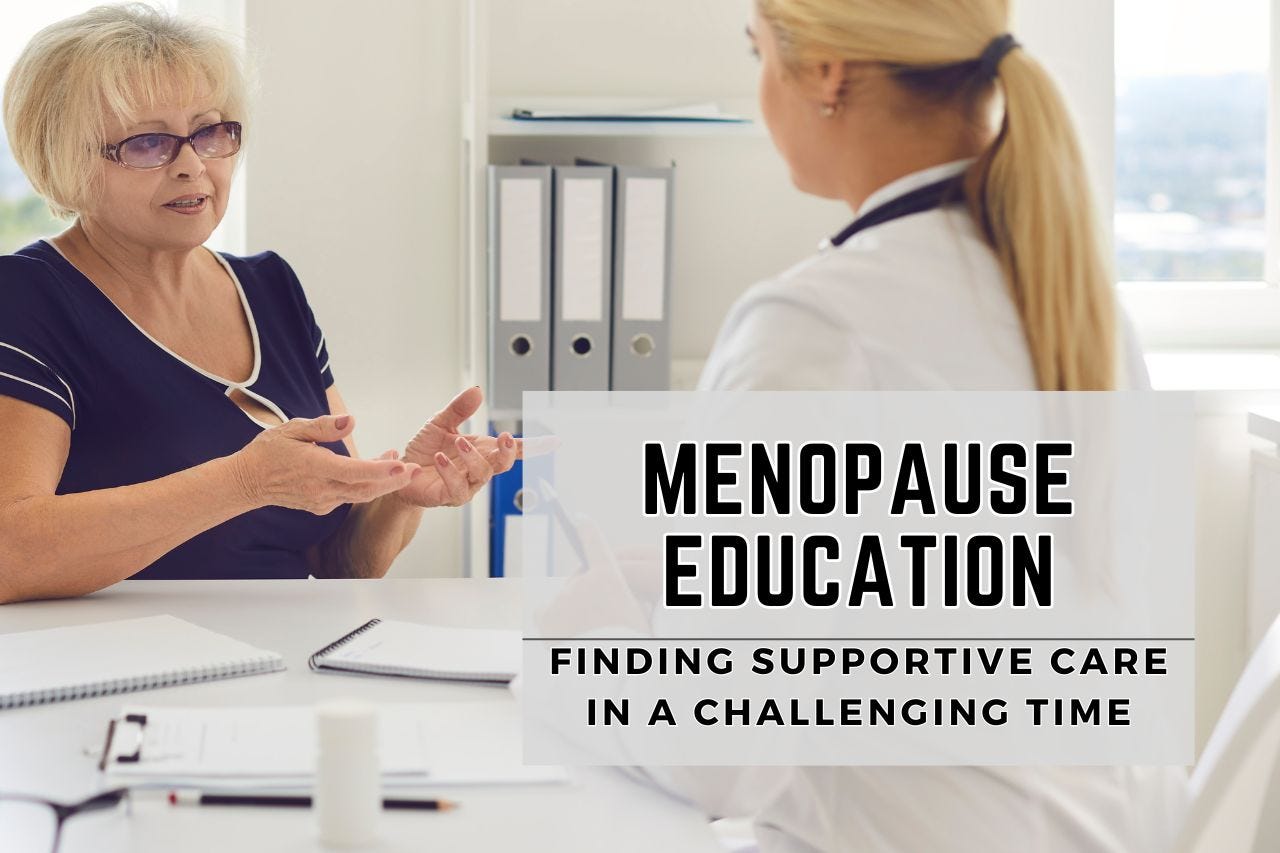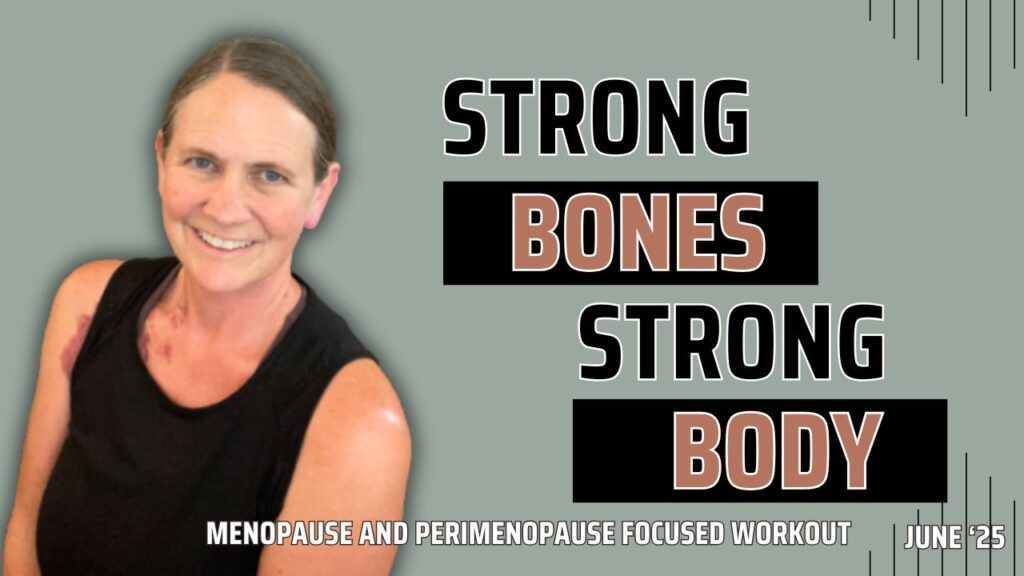Menopause Education: Finding Supportive Care in a Challenging Time
How to Advocate for Yourself and Get the Care You Deserve
Part Two of the Midlife Wellness Series
Perimenopause and menopause education is not as straight-forward as one would think. Oftentimes, women navigate a lot of unknowns—and sometimes, that includes trying to make sense of own healthcare. For many women, this transition can feel like a lonely road with more questions than answers. This is the second article in my 10-part Midlife Wellness series (read part one here). In this article we’re focusing on one of the most important steps: finding a provider who listens, understands, and supports your whole health, not just your symptoms.
Why the Right Provider Matters
Menopause affects far more than your reproductive system—it touches your bones, brain, sleep, mood, metabolism, and more. Yet shockingly, most doctors aren’t taught much about this transition. According to a 2023 study published in Menopause: The Journal of The North American Menopause Society, fewer than 1 in 5 OB/GYN residency programs offer formal menopause education. That means many well-meaning providers are simply not trained to guide women through this time with up-to-date information and compassionate care.
Barriers to Care: Why Many Women Still Struggle to Get Help
Despite how common menopause is, many women face real challenges when it comes to getting proper support and treatment.
Here are a few eye-opening statistics:
According to a 2022 national survey by Elektra Health, 3 in 4 women say their doctors aren’t adequately trained to help them through menopause.
Nearly 80% of women report experiencing menopause symptoms that interfere with daily life, yet fewer than 30% ever receive treatment.
A substantial percentage of women—estimated at 75%—do not seek medical advice or treatment for their symptoms, and about half of those who do delay seeking help for more than six months.
A study published in Menopause found that more than half of women felt unprepared for perimenopause and didn’t know what to expect.
Access and cost also play a role—rural women, uninsured women, and women of color often face higher barriers to receiving menopause care.
It’s important to remember that this gap in care is not always the fault of individual doctors. Most medical schools and residency programs offer very limited menopause education, and continuing education often doesn’t fill those gaps. Many providers simply aren’t aware of the full range of support options available, or how deeply menopause can affect every part of a woman’s life.
This is why advocating for yourself, asking questions, and seeking out menopause-informed providers is so important. The more we understand and speak up, the more the culture of care can shift, for everyone.
How to Find a Menopause-Informed Provider
If your symptoms are dismissed as “just part of aging,” or if you’ve been told to “wait it out,” it may be time to find someone new. The Menopause Society’s Menopause Practitioner Finder is a helpful tool to locate providers trained in the latest menopause science.
You can search for in-person or virtual menopause care providers. While virtual options can be a great starting point, I believe in-person care is ideal when possible. Seeing someone face-to-face allows for physical assessments, lab testing, and a level of connection that’s hard to match online.
When searching for a provider, here are a few helpful tips:
Ask if they’ve had any specific training in menopause education care.
Make sure they are open to discussing options such as hormone therapy and beyond. This might include non-hormonal support, lifestyle changes, or integrative approaches.
Notice how they treat you. A good provider will listen, respect your concerns, and work collaboratively to build a care plan that fits your needs and values.
Every woman deserves access to perimenopause/menopause support that feels personalized and empowering.
A Look Back: Menopause Education and the Women’s Health Initiative
Much of the confusion around hormone therapy in menopause stems from the 2002 Women’s Health Initiative (WHI) study, which linked Hormone Replacement Therapy (HRT) to increased risks of breast cancer. I was working in oncology at the time and remember how much this study changed the way we treated midlife women. It was all over the news, pushing a narrative of fear. Overnight, millions stopped therapy, and a deep distrust around hormones took hold.
But the truth is, the initial interpretation of the study was flawed. Later analyses showed that many of the risks were found in women who began hormone therapy well after menopause. Newer data now shows that, for the right candidates, starting HRT within 10 years of menopause may offer many benefits. The big ones include: supporting heart health, protecting bones, easing symptoms, and improving quality of life. Be sure to talk to your doctor about this new data when trying to find the best path for you.
That said, not all women are candidates for hormone therapy. Some women may choose not to go the route of hormone replacement. However, what matters most is that every woman gets to have the conversation with her provider. The decision whether to initiate treatment or not should be informed, individualized, and made in partnership.
What About Bioidentical Hormones?
You may have heard the term bioidentical hormones—these are hormones that are structurally identical to those naturally made by your body. Some are FDA-approved and available at standard pharmacies, while others are compounded for custom doses. Compounded hormone therapy can be helpful in certain cases, but it’s important to know that it’s not regulated the same way as commercial options.
If you’re exploring bioidentical hormone therapy for menopause, it’s essential to work with a provider who understands the difference, knows the risks and benefits, and can monitor your treatment safely.
Strength for the Journey
While you’re exploring your care options and receiving menopause education, don’t forget how much your movement and mindset matter. I’ve created Strong Bones Strong Body, an online class in my library specifically designed for women in midlife and beyond. Grounded in the latest research, these sessions are designed to support your bone density, muscle strength, balance, and energy—all from the comfort of your home.
Writer’s Perspective
This is the time in your life to not take the back seat! Personally, I believe it is the time to stop playing small and advocate for yourself more than ever. As I say in my fitness classes, be your number 1 cheerleader!
On a personal note, I didn’t even realize I was in peri-menopause for quite some time. I went to my regular yearly gynecologist visits and the topic never came up. When I asked questions my symptoms were brushed off and I brushed them off too. Six months ago things drastically changed. My symptoms became intolerable. Thank goodness for a close friend who pushed me into getting help. After 6 months on bio-identical hormones, some lifestyle/fitness tweaks, and some changes in my nutrition I am feeling much more like my old self!
I am excited to offer more details of the small changes that led to big improvements in my next articles in this series. Coming up next we’ll explore the complicated relationship between menopause and sleep. Diving into why it’s so disrupted and how you can finally get the rest your body needs.
Previous Articles in This Series:
✅ Subscribe Below to stay in the loop, and
✅ Share this post with a friend who’s ready to feel strong, supported, and empowered in her body—through menopause and beyond.
✅Leave a comment. Let’s get this conversation going and support each other!
Keep asking questions, keep honoring your body, keep advocating for yourself. There is a better way forward and you deserve an opportunity to explore all your options!
I believe in blending lived experience with evidence-based insight. If you’re curious to explore more, here are some of the trusted sources that informed this article.






